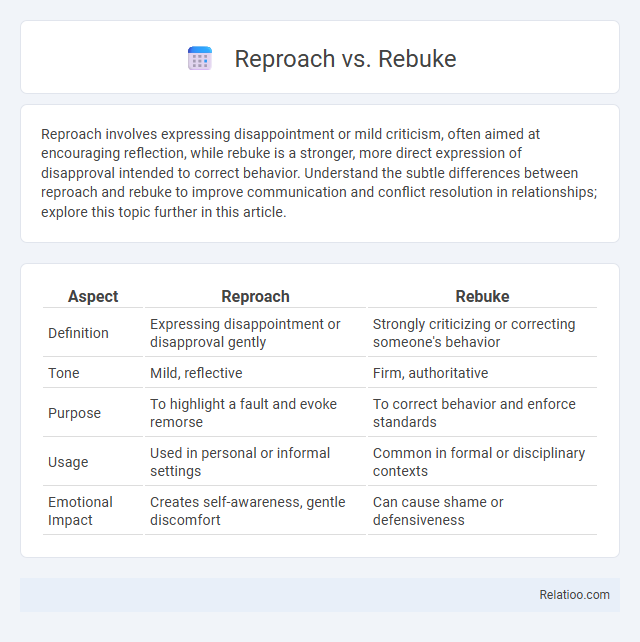Reproach involves expressing disappointment or mild criticism, often aimed at encouraging reflection, while rebuke is a stronger, more direct expression of disapproval intended to correct behavior. Understand the subtle differences between reproach and rebuke to improve communication and conflict resolution in relationships; explore this topic further in this article.
Table of Comparison
| Aspect | Reproach | Rebuke |
|---|---|---|
| Definition | Expressing disappointment or disapproval gently | Strongly criticizing or correcting someone's behavior |
| Tone | Mild, reflective | Firm, authoritative |
| Purpose | To highlight a fault and evoke remorse | To correct behavior and enforce standards |
| Usage | Used in personal or informal settings | Common in formal or disciplinary contexts |
| Emotional Impact | Creates self-awareness, gentle discomfort | Can cause shame or defensiveness |
Understanding the Difference: Reproach vs Rebuke
Reproach and rebuke both express disapproval but differ in tone and intent. Reproach conveys disappointment or shame, often implicit and emotional, while rebuke is more direct, authoritative, and meant to correct behavior. Understanding these distinctions helps in choosing the appropriate response in interpersonal communication and conflict resolution.
Definitions: What is Reproach? What is Rebuke?
Reproach refers to expressing disappointment or disapproval toward someone's actions or behavior, often implying a sense of shame or blame. Rebuke is a sharp or formal expression of criticism or censure aimed at correcting or admonishing someone's fault or misconduct. Both terms involve conveying dissatisfaction, but reproach is generally more indirect and emotional, while rebuke tends to be direct and authoritative.
Etymology and Origins of Both Terms
Reproach and rebuke both stem from Latin roots, with reproach originating from "reprobare," meaning to disapprove or reject, emphasizing shame or disappointment. Rebuke derives from the Old French "rebuquer," which traces back to Latin "rebuccare," meaning to retort or check, focusing on stern correction. Understanding these origins clarifies how your use of reproach conveys emotional disapproval, while rebuke implies direct verbal reprimand.
Tone and Intensity: Subtle vs Direct Confrontation
Reproach often involves subtle criticism that gently signals disappointment or disapproval, maintaining a softer tone compared to rebuke. Rebuke delivers direct and forceful confrontation, emphasizing the seriousness of the fault with a clear and intense expression of displeasure. Understanding the distinctions in tone and intensity helps you choose the appropriate response for different situations, ensuring effective communication without unnecessary harshness.
Contexts of Usage: When to Use Reproach vs Rebuke
Reproach is typically used in contexts involving expressing disappointment or shame subtly, often conveying personal or emotional disapproval. Rebuke is more direct and formal, appropriate for addressing clear misconduct or mistakes, especially in professional or authoritative settings. Understanding the intensity and context--reproach for mild, relational censure and rebuke for explicit, corrective admonishment--guides effective usage between the two terms.
Emotional Impact on Receiver
Reproach carries a gentle tone of disappointment that makes your receiver feel subtly disheartened, emphasizing personal regret or a lapse in judgment. Rebuke delivers a stronger, more direct criticism that often triggers defensiveness and feelings of guilt or shame, highlighting fault or unacceptable behavior. Understanding the emotional impact of these terms can help you choose the appropriate way to address mistakes while managing the receiver's response effectively.
Examples in Real-Life Scenarios
Reproach involves expressing disappointment or disapproval, such as when a teacher gently reproaches a student for incomplete homework, signaling concern rather than anger. Rebuke is more direct and stern, often used by managers who immediately rebuke an employee for missing a crucial deadline, emphasizing accountability. Your understanding of these terms deepens by recognizing that reproach can be subtle and reflective, while rebuke carries a sharper tone intended to correct behavior promptly.
Reproach vs Rebuke in Workplace Communication
Reproach in workplace communication often implies expressing disappointment or disapproval subtly, aiming to maintain professionalism while addressing mistakes. Rebuke conveys a stronger, more direct form of criticism, typically highlighting serious errors or misconduct with clear authority. Understanding the nuanced differences between reproach and rebuke helps managers balance corrective feedback with employee morale in organizational settings.
Psychological Effects of Reproach and Rebuke
Reproach and rebuke both involve expressing disapproval but differ in tone and intensity; reproach tends to be milder and more indirect, while rebuke is often direct and stern. The psychological effects of reproach can lead to feelings of guilt and self-reflection, fostering personal growth if delivered constructively, whereas rebuke may induce shame or defensiveness, potentially harming self-esteem and motivation. Understanding how your response to reproach or rebuke impacts emotional well-being can help improve communication and relationships.
Choosing the Right Approach for Effective Communication
Choosing the right approach between reproach, rebuke, and reprimand is crucial for effective communication, as each conveys a different level of criticism and tone. Reproach gently highlights disappointment, making it suitable for maintaining relationships, while rebuke delivers a stronger, more direct disapproval often used in formal or authoritative settings. Understanding the context and emotional impact of each term helps tailor feedback to ensure clarity, respect, and constructive outcomes.

Infographic: Reproach vs Rebuke
 relatioo.com
relatioo.com